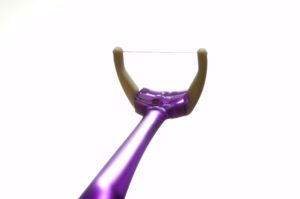As a parent, the best way to help ensure your child has a lifetime of healthy teeth is to help them establish great dental hygiene habits as they grow.

Here are some useful tips for keeping your child engaged by making dental hygiene fun:
Pick out a special toothbrush.
One great way to keep your child excited about brushing is to allow him or her to choose their own toothbrush in a favorite color or branded with a favorite cartoon character. Child-size soft-bristled brushes come in a wide variety of options designed to make your child like their toothbrush.
Choose children’s toothpaste.
Another great option is to use a toothpaste that is designed for kids. While adults generally prefer the fresh mouth taste of a minty toothpaste, many children find mint to be too powerful a flavor. This can make brushing unpleasant or even painful to sensitive taste buds. Instead, let your child choose a children’s toothpaste. There are many options available in a variety of soft mint, fruity, and bubble gum flavors. It is much easier to keep your child brushing for a full two minutes when their toothpaste tastes good.
Use a timer.
Two minutes can seem like a long time to a child. It can be very difficult for your child to try to estimate or count how long to brush without some kind of visual aid. You can help your child stay more engaged and ensure a full two minutes of brushing by using a timer. Choices range from a small sand timer your child can flip over, to a manual stopwatch with buttons to press, or even an app on a phone or tablet to time digitally (if your child is old enough). By letting your child take control of the timer, they can be more confident and more engaged in their brushing.
Brush together.
A parent is the first and strongest role model for their child. Brushing together can help your child model your great brushing technique, which will improve their own. Additionally, brushing together emphasizes to your child that brushing is important. When your child sees that you take dental hygiene seriously, they are likely to follow suit.
For more tips on making dental hygiene fun for your child, contact our office.
West Allis WI Dentist | To Floss or Not to Floss?
By now, you have likely seen news reports questioning whether flossing is necessary for your oral health.

We want to answer your question right away with an absolute YES. Cleaning between your teeth is an essential part of caring for your teeth and gums.
Whether you use traditional string dental floss, a water flosser, an interdental (between teeth) brush, or other form of interdental cleaning, it is important that you clean between your teeth correctly and on a daily basis.
Unfortunately, in the quest for catchy headlines, many news agencies have been providing a great deal of incomplete and inaccurate information.
Here’s the truth: Plaque and bacteria can be prevented from building up between teeth when flossing is done correctly on a daily basis.
Why does that matter? Build-up of plaque and bacteria between teeth is one of the leading causes of periodontal disease, a condition which not only affects your mouth, teeth, and gums, but has been linked to complications with diabetes, heart disease, Alzheimer’s disease, and many other systemic health issues.
The next time you visit our office, ask your hygienist to show you the most effective way to clean between your teeth. For more information on flossing and interdental cleaning or to schedule an appointment, please contact us.
West Allis WI Dentist | Oral Cancer Screening Can Save Your Life
Our expert dentist wants to remind patients that our office offers thorough oral cancer screening as part of our comprehensive dental health services. Like with every form of cancer, early diagnosis can have a profound impact on the success of your treatment. Regular screenings are your first line of defense against oral cancer and our doctor is here to help.

In your screening, our doctor will check your lips, tongue, gums, mouth, and throat for any abnormalities that could be or become cancerous. We will give careful consideration to any symptoms you may be experiencing. If you have experienced any oral cancer symptoms for more than a week without improvement, schedule an appointment and tell your dentist immediately. Symptoms that could indicate oral cancer include:
- Ear pain
- Unexplained mouth bleeding
- Mouth sores that don’t heal
- White or red patches in your mouth
- Dramatic weight loss
- Lumps or swellings in or around your mouth
- Sore throat without other sinus symptoms
- Sensation of something caught in the back of your throat
- Pain or difficulty in swallowing, speaking, or moving your jaw or tongue
One adult American dies of oral cancer every hour. Though anyone can develop oral cancer, some factors can increase your risks. Some of the most common risk factors include: genetic predisposition, prolonged sun exposure, unhealthy diet, and excessive consumption of alcoholic beverages. Oral cancer is more common in men than women. Patients with gastro-esophageal reflux disease (GERD) are at increased risk. Users of tobacco in any form are six times more likely to develop oral cancer than non-users.
Whatever the cause, the success of treatment depends on the size, type, and stage of the cancer. Early detection can play a critical role in your successful recovery. When found in early stages, oral cancers have an 80 – 90% survival rate. The primary reason for this is that early detection leads to earlier treatment. Oral cancers that are found in early or precancerous stages can often be removed and require less invasive procedures to treat. Later stages of cancer are likely to be larger and more complex and often have spread far beyond your mouth.
We are accepting new patients. If you would like more information about oral cancer and oral cancer screening, contact our office for a consultation.
West Allis WI Dentist | Providing Relief from Periodontal Disease

Dentist in West Allis | Only Floss The Teeth You Want To Keep
 | Every time you stop in to visit your dentist, you are asked, “Do you floss regularly?” This is because flossing is instrumental in maintaining a healthy, beautiful smile. It helps to remove the plaque that brushing alone can’t reach. While we all know brushing is critical to your oral health, it is important to understand the benefits of flossing daily.
| Every time you stop in to visit your dentist, you are asked, “Do you floss regularly?” This is because flossing is instrumental in maintaining a healthy, beautiful smile. It helps to remove the plaque that brushing alone can’t reach. While we all know brushing is critical to your oral health, it is important to understand the benefits of flossing daily.
Flossing is a great way to protect your gums. When you floss, your dentist recommends also working between your gums and teeth in order to remove plaque within between your gums. This will prevent the accumulation of plaque that eventually hardens into tartar. Tartar buildup can cause gum disease, which is the leading cause of tooth loss. While you can remove plaque from your teeth and gums, tartar is much stronger, meaning that it requires a trip to your dentist in order to remove it. Simple, preventative care such as flossing regularly can help to ward off tartar and to keep all of your teeth.
Flossing can also provide financial benefits. This preventative care can reduce more severe problems down the road. Regular visits to the dentist for a cleaning is a lot more cost effective than needing emergency care due to a lack of flossing. Flossing is a great way to stop the problems before they even start.
Flossing is also beneficial to your overall health. By maintaining great oral health, you are able to prevent other systemic problems such as heart disease and respiratory disease.
Contact our office today to schedule your next appointment and stay on top of your oral health.
Dentist West Allis | Bad Breath Remedies
 According to the American Dental Association, 50 percent of adults experience bad breath at some point in their life. Although some causes are harmless, other causes may be signaling something more serious. Below are three common causes of bad breath, accompanied by the best remedy for each cause.
According to the American Dental Association, 50 percent of adults experience bad breath at some point in their life. Although some causes are harmless, other causes may be signaling something more serious. Below are three common causes of bad breath, accompanied by the best remedy for each cause.
Cause of Bad Breath: Food
Have you ever heard the phrase, “You are what you eat”? Many foods and spices, such as onions, garlic, and coffee, leave a lingering odor on your breath.
Nothing rids your breath of odor like brushing and flossing. Brushing and flossing also keeps your mouth free from bacteria, preventing any infections. Mouthwash is a great backup solution. Although the use of mouthwash is only a temporary fix for bad breath, it too works to remove potentially harmful bacteria in your mouth.
Cause of Bad Breath: Dry Mouth
Does it feel like you just can’t quench your thirst? Dry mouth is due to your mouth not producing enough saliva. It is often a symptom of medications, salivary gland problems, or breathing through your mouth.
Foods that require more chewing can increase saliva production. Healthy foods such as carrots and apples are great choices. Another alternative is to chew sugar-free gum.
Cause of Bad Breath: Medical Conditions
Bacteria and infections in the mouth can cause bad breath. Bad breath may also be a sign of conditions affecting the sinuses, liver, or kidneys, as well as a sign of acid reflux or diabetes.
By visiting our office regularly, our team is able to detect any problems or infections, and stop them before they become serious.
Schedule your visit to our office today. Contact our team.
West Allis, WI Dentist | Are You Brushing Properly?
 Many people may be surprised to learn that they have been brushing their teeth incorrectly for years. Improper brushing may cause oral health complications, including tooth enamel erosion and periodontal disease. Learn how to brush your teeth correctly and you can protect them for years to come.
Many people may be surprised to learn that they have been brushing their teeth incorrectly for years. Improper brushing may cause oral health complications, including tooth enamel erosion and periodontal disease. Learn how to brush your teeth correctly and you can protect them for years to come.
The most common way for people brush their teeth is by using a back and forth motion. This resembles sawing the toothbrush back and forth across the surface of the teeth until they feel clean and slippery. However, this is not an effective to brush your teeth. First, this method also does not clean effectively. Since the bristles are moving back and forth, they are essentially bouncing from one tooth to the next, which causes you to miss the spaces in between the teeth to remove plaque and other tiny particles of food.
In addition, brushing with a sawing motion is very abrasive to your teeth and gums. This can cause you to scrub away tooth enamel, along with food debris. Overbrushing in this fashion can increase your risk of sensitivity, tooth decay, and receding gums.
For a safer, more effective brushing method, start by placing your toothbrush at a 45-degree angle to where your teeth meet the gums. Then gently move your toothbrush back and forth and making sure the bristles cover each tooth and work their way around the sides of the tooth. This method allows you to find all the food particles and plaque in the spaces between your teeth.
Note: if you use an electric toothbrush, you may still be overbrushing your teeth. Despite your instincts to scrub manually, an electric toothbrush yields best results when used to cover each tooth individually for a few seconds, then moved to the next. The brush itself provides all the motion needed to thoroughly clean the surfaces of your teeth.
The value of proper brushing is often overlooked, but it is a vital part of keeping your teeth and gums healthy. Using the right method to brush your teeth will prevent build-up of harmful plaque that can lead to many oral health issues. Brushing properly can help prevent tooth decay, gingivitis, oral infections, and more.
It can be challenging to retrain yourself after you have been brushing the same way for years. Switching methods may take some adjustment, but you will love the results. If you have any questions regarding the most effective methods of brushing your teeth, please contact our office.
West Allis Dentist | 5 Tips for Denture Wearers

Taking care of your dentures can seem like an added chore. Don’t worry, with a little effort your dentures can stay clean. Here are 5 tips for keeping your dentures clean and your smile healthy.
- Rinse Thoroughly
Prior to brushing, it helps to rinse your dentures off. Run them through water to help wash away food and other small particles. Be extra careful when handling your fragile dentures. Avoid using hot or boiling water, as that could damage your dentures.
2. Clean Your Dentures
Just as you would brush your teeth, your dentures need to be brushed as well. Never use cleaning solutions while your dentures are in. Rather, remove your dentures and carefully brush using a soft toothbrush. Avoid using whitening toothpastes or harsh cleaning materials like bleach products. Talk to our dentist about the right type of cleaner for your dentures. Using too strong a solution can cause damage to your dentures.
- Don’t Forget to Brush Your Teeth
You still need to take care of your natural teeth. Brush your teeth with a soft toothbrush. Be gentle when brushing and cleaning your gums. Cleaning your gums will help you reduce your risk of developing an oral infection. If your toothbrush is too rough on your gums, an alternative is to use gauze. Be sure to come see us if you are experiencing gum pain and we can make recommendations.
- Keep Them Covered
When you remove your dentures for bed, be sure to keep them in a covered container overnight. Use a denture-soaking solution to keep them clean overnight. Water works as a substitute, as your dentures need moisture to retain their shape. If you have any questions about storing your dentures, talk to us and we’ll help you.
- Care with Adhesives
It can sometimes be difficult to remove your dentures with an adhesive. If you are having trouble, try swishing warm water or a mouthwash around your mouth. Never use any cleaning solution, tool, or foreign object to remove your dentures. Take special care to ensure the grooves of your dentures that attach to your gums are clean and free of adhesive.
When taken care of properly, your dentures will provide you with a lasting smile. Be vigilant in keeping up with cleaning your dentures. If you have any questions about caring for your dentures, get in touch with our office. We would be happy to work with you to figure out a solution for your denture concerns.
For more tips on keeping your mouth healthy or to schedule your next appointment, contact us today.
Be a Part of Our Family
Thanks for choosing Anderson General Dentistry & Implants for your dental services. We’re excited to welcome you to our family!
We look forward to learning more about you and
what we can do for your family’s healthy smiles.

Visit Our Dental Office
Our Convenient Office Hours
Monday: 8:30am – 5:00pm
Tuesday: 8:30am – 5:30pm
Wednesday: 8:30am – 1:30pm
Thursday: 9am - 12pm
Friday: 8:30am – 4:30pm
We Are Located At

